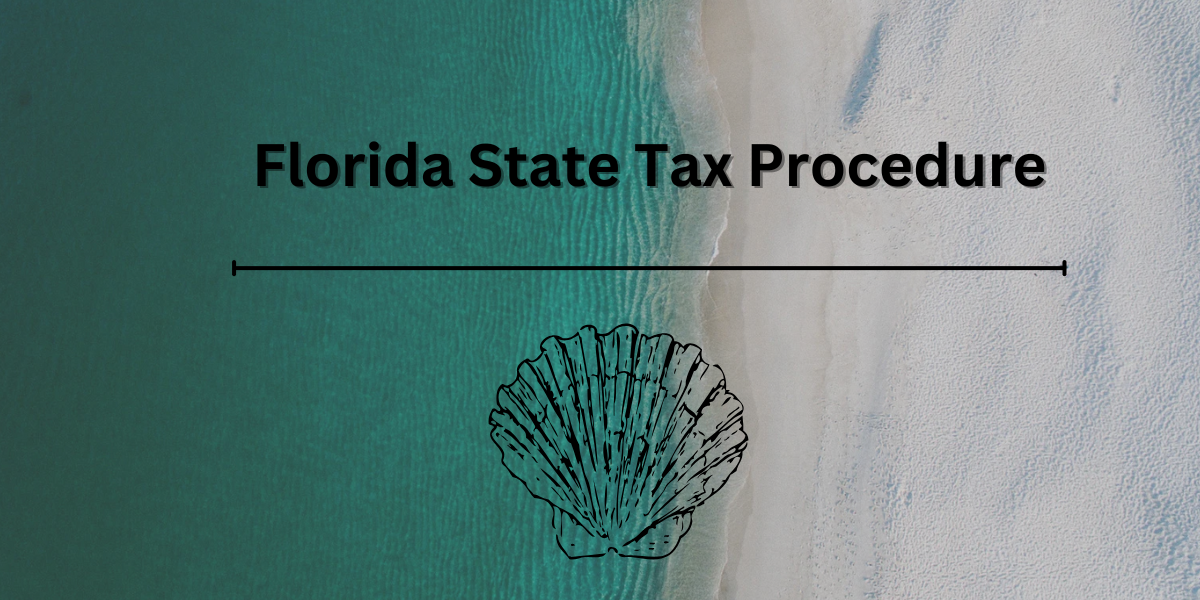NEWS & INSIGHTS


Florida’s state and local tax (SALT) procedures are critical for businesses and individuals to understand, particularly when dealing with tax compliance, audits, and disputes. While Florida does not impose a personal income tax, it relies on various revenue sources, including sales and use tax, corporate income tax, documentary stamp tax, and ad valorem property taxes. The Florida Department of Revenue (DOR) is the primary agency responsible for tax administration, but several other agencies, including the Department of Business & Professional Regulation (DBPR) and local governments, also play roles in tax enforcement.
Navigating Florida’s tax laws requires proactive compliance strategies, familiarity with voluntary disclosure programs, and an understanding of administrative and judicial dispute resolution procedures. Businesses that receive audit notices or tax assessments must be aware of their rights and legal remedies, including informal protests, administrative appeals, and litigation in circuit court. Venue and jurisdictional requirements play a crucial role in tax disputes, with Florida courts enforcing strict procedural rules that can impact a taxpayer’s ability to challenge assessments. This article explores these tax procedures in depth, with a focus on statutory requirements, case law, and best practices for taxpayers.
Avoiding Tax Disputes: Compliance Strategies
One of the most effective ways to avoid tax disputes is to proactively comply with Florida’s tax laws. Businesses should ensure they are properly registered in all relevant jurisdictions and comply with licensing and reporting requirements. Regular reviews of Florida’s tax statutes, administrative rules, and agency guidance help businesses stay compliant and avoid penalties.
For complex tax issues, businesses can seek Technical Assistance Advisements (TAA) or Letter Technical Advice (LTA) from the DOR. These formal rulings provide authoritative guidance on tax matters and can be used to support tax positions in audits and disputes. Additionally, routine SALT (State and Local Tax) evaluations help businesses identify risks, correct errors before an audit, and implement best practices for tax compliance.
Voluntary Disclosure Agreements (VDA)
Florida offers a Voluntary Disclosure Agreement (VDA) program for taxpayers who discover they owe back taxes and wish to come forward without facing significant penalties. To qualify, a taxpayer must not have been previously contacted by the DOR regarding the liability. The disclosure must include the tax type, applicable periods, and any unremitted tax collected.
Benefits of the VDA Program:
- Penalty Waiver: Unless the taxpayer collected but failed to remit tax.
- Limited Look-Back Period: Generally three years.
- Reduced Audit Risk: Voluntary disclosure may prevent future audits.
- Protection from Criminal Prosecution: The VDA process can eliminate the risk of criminal liability for tax evasion.
Taxpayers should carefully assess their eligibility for the VDA program, as participation requires full disclosure of liabilities. Florida Statute § 213.21(7) outlines the legal framework for voluntary disclosures.
Tax Audits: Procedures and Legal Considerations
Florida’s tax audit process begins with a DR-840 Notice of Intent to Audit Books and Records, providing a 60-day preparation period. The standard audit period is three years unless extended by agreement or triggered by fraud. Auditors request financial records, sales tax filings, bank statements, and other documentation to verify compliance. If the audit results in additional tax liability, the DOR issues a DR-1215 Notice of Intent to Make Audit Changes, allowing a 30-day response window before final assessment.
Statute of Limitations and Tolling
Florida’s general statute of limitations for tax assessments is three years (§ 95.091(3), Fla. Stat.), but it can be tolled under certain conditions:
- If the taxpayer fails to file a required return.
- If the taxpayer files a fraudulent return.
- If the taxpayer signs a statute of limitations extension agreement (Form DR-872).
The case Verizon Business Purchasing, LLC v. DOR, 164 So. 3d 806 (Fla. 1st DCA 2015) held that an extension agreement applied to the entire audit period, emphasizing the importance of carefully negotiating such agreements.
Dispute Resolution and Litigation: Jurisdiction, Venue, and Case Law
If a taxpayer disagrees with an assessment, they have multiple dispute resolution options, each with distinct jurisdictional and venue requirements.
Informal Protest
Taxpayers can file an informal protest within 60 days of receiving a Notice of Proposed Assessment (NOPA). The DOR’s Office of Internal Dispute Resolution reviews these protests. If the dispute remains unresolved, taxpayers may request a Notice of Decision (NOD) or Notice of Reconsideration (NOR).
Administrative Challenges Under Chapter 120, Florida Statutes
Under Florida’s Administrative Procedure Act (APA), taxpayers can file a petition within 120 days of the NOPA to challenge the assessment before an Administrative Law Judge (ALJ). The ALJ issues a Recommended Order, which the DOR may accept, modify, or reject.
Administrative proceedings are governed by § 120.569 and § 120.57, Fla. Stat.. The case State Dep’t of Revenue v. Ray Constr. of Okaloosa Cty., 667 So. 2d 859 (Fla. 1st DCA 1996) established that strict procedural deadlines apply to administrative tax disputes, and missing a filing deadline can result in dismissal.
Circuit Court Litigation
Taxpayers may file suit in circuit court within 60 days of the assessment becoming final. Venue is generally in Leon County, where the DOR is headquartered, or in the taxpayer’s home county if they reside, maintain their principal commercial domicile, or keep business records there (§ 72.011(4), Fla. Stat.). For out-of-state businesses, venue is in Leon County.
The case American Heritage Window Fashions, LLC v. Dep’t of Revenue, 191 So. 3d 516 (Fla. 2d DCA 2016) confirmed that these venue and timing requirements are jurisdictional, meaning failure to meet them results in automatic dismissal.
Financial Security Requirements for Circuit Court Actions
A taxpayer must:
- Pay any uncontested portion of the assessment.
- Post a bond or deposit the contested amount with the court (§ 72.011(3), Fla. Stat.).
- Meet all filing deadlines, as failure to do so results in dismissal and an additional 25% penalty.
An exception exists for de minimis errors—if the underpayment is less than 5%, courts may allow taxpayers a reasonable time to correct the issue (§ 72.011(3), Fla. Stat.).
The case Dep’t of Revenue v. Nu-Life Health & Fitness Ctr., 623 So. 2d 747 (Fla. 1st DCA 1993) upheld the constitutionality of requiring financial security for circuit court challenges, ruling that it does not violate a taxpayer’s right to access the courts.
Judicial Review and Agency Deference
In 2018, Florida voters approved Amendment 6, eliminating Chevron deference for agency decisions. Courts now review tax disputes de novo, meaning they no longer automatically defer to the DOR’s interpretation of tax laws (§ 120.57, Fla. Stat.). This change benefits taxpayers by ensuring a more balanced judicial review.
Conclusion
Florida’s tax procedures are complex, requiring businesses to engage in proactive compliance, thorough record-keeping, and strategic dispute resolution. Whether dealing with audits, voluntary disclosures, or litigation, taxpayers must understand jurisdictional requirements, venue rules, and strict filing deadlines. Recent case law highlights the importance of procedural compliance in tax disputes. Consulting an experienced state and local tax attorney can help businesses navigate audits, assessments, and litigation while protecting their rights.
Additional Articles by the SALTy Orange at Moffa Tax Law:
NEWS & INSIGHTS State Conformity with the BBA Partnership Audit Rules: Where Are We in 2025? State Conformity with the…
How Florida’s Sales Tax Auditors Target Convenience Stores (and What You Can Do About It)”
NEWS & INSIGHTS How Florida’s Sales Tax Auditors Target Convenience Stores (and What You Can Do About It) Florida Department…
NEWS & INSIGHTS Florida Sales Tax Guide for Convenience Stores: What Every C-Store Owner Must Know Convenience stores are a…

Jeanette Moffa, Esq.
(954) 800-4138
JeanetteMoffa@MoffaTaxLaw.com
Jeanette Moffa is a Partner in the Fort Lauderdale office of Moffa, Sutton, & Donnini. She focuses her practice in Florida state and local tax. Jeanette provides SALT planning and consulting as part of her practice, addressing issues such as nexus and taxability, including exemptions, inclusions, and exclusions of transactions from the tax base. In addition, she handles tax controversy, working with state and local agencies in resolution of assessment and refund cases. She also litigates state and local tax and administrative law issues.


